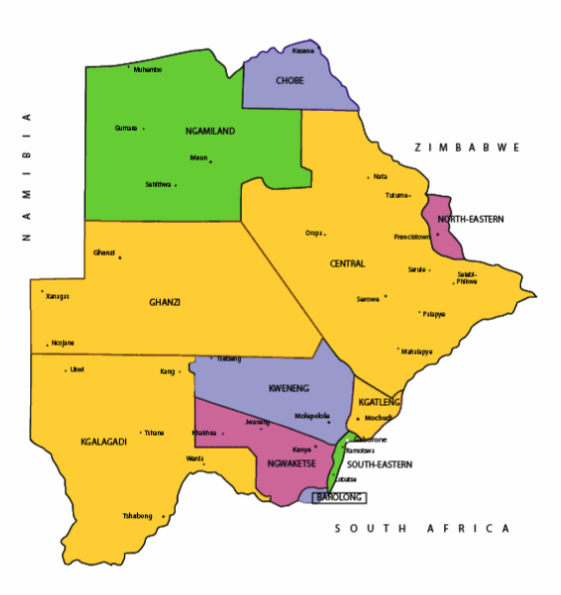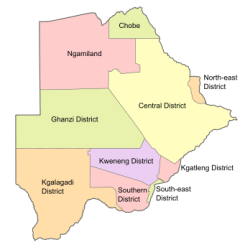Places and their polling stations in Serowe South, Botswana
213 Manonnye
1076 Manonnye Primary School
1077 Bakwena Kgari JSS
1078 Modimo Kgotla
1079 Rasesoma Kgotla
214 Serowe South Central
1080 Tshekedi Primary School
1081 Simon Ratshosa Primary School
1082 Grace Kgari Primary School
1083 Masuga Hall
215 Mogatsapoo
1084 Motshwana Kgotla
1085 Buildings Department
1086 Makolo Primary School
1087 Seiswane Community Hall
216 Radisele
1088 Radisele Primary School
1089 Madiaela Health Post
1090 Wuc Office
1091 Radisele Kgotla
217 Mogome-Mokgware
1092 Mogome Primary School
1093 Mokgware Primary School
1094 Tshethong Kgotla
1095 Segakwana Kgotla
218 Moiyabana
1096 Moiyabana Primary School
1097 Moiyabana Community Hall
1098 Mothamo JSS
1099 Itsokwane Kgotla
219 Motshegaletau
1100 Mabuo Primary School
1101 Sehunuo Primary School
1102 Motshegaletau Primary School
220 Mogorosi-Thabala
1103 Thabala Primary School
1104 Thabala Community Hall
1105 Mogorosi Primary School
Reference: iec.gov.bw/index.php/electoral-districts/polling-stations.html
Botswana
Botswana is a country in Africa. It is topographically flat, with approximately 70 percent of its territory being the Kalahari Desert.
It is bordered by South Africa to the south and southeast, Namibia to the west and north, and Zimbabwe to the northeast.
Capital: Gaborone
Currency: Botswanan Pula
Official language: English
Population: 2.588 million (2021) World Bank
Dialing code: +267
Gross Domestic Product: 17.61 billion USD (2021) World Bank
Botswana’s ten districts are:
- Southern District
- South-East District
- Kweneng District
- Kgatleng District
- Central District
- North-East District
- Ngamiland District
- Kgalagadi District
- Chobe District
- Ghanzi District
Botswana’s councils created from urban or town councils are: Gaborone City, Francistown, Lobatse Town, Selebi-Phikwe Town, Jwaneng Town, Orapa Town and Sowa Township.






The name Botswana refers to ‘Land of the Tswana’. The landlocked, Southern Africa country is officially known as the Republic of Botswana.














Botswana is connected to Zambia through the Kazungula Bridge making it the world’s shortest border between two countries.
A country of slightly over 2 million people (2021), Botswana is one of the most sparsely populated countries in the world. It is essentially the nation state of the Tswana ethnic group, who make up 79% of the population.

About 11.6 per cent of the population lives in the capital and largest city, Gaborone.
Formerly one of the world’s poorest countries—with a GDP per capita of about US$70 per year in the late 1960s—it has since transformed itself into an upper-middle-income country, with one of the world’s fastest-growing economies.


The Tswana ethnic group were descended mainly from Bantu-speaking tribes who migrated southward of Africa to modern Botswana, living in tribal enclaves as farmers and herders.




In 1885, the British colonised the area and declared a protectorate under the name of Bechuanaland.
As colonisation stopped, Bechuanaland became an independent republic under its current name on 30 September 1966.


Since then, it has been a representative republic, with a consistent record of uninterrupted democratic elections and the lowest perceived corruption ranking in Africa since at least 1998.

The economy is dominated by mining and tourism. Botswana has a GDP (purchasing power parity) per capita of about $18,113 as of 2021, one of the highest in subsaharan Africa.


Botswana is the world’s biggest diamond producing country.
Its relatively high gross national income per capita gives the country a high standard of living and the third-highest Human Development Index of continental Sub-Saharan Africa (after Gabon and South Africa).
The country has been adversely affected by the HIV/AIDS epidemic. In 2002, Botswana began offering anti-retroviral drugs (ARVs) to help combat the epidemic.
Botswana is a member of the Southern African Customs Union, the Southern African Development Community, the Commonwealth of Nations, and the United Nations.

